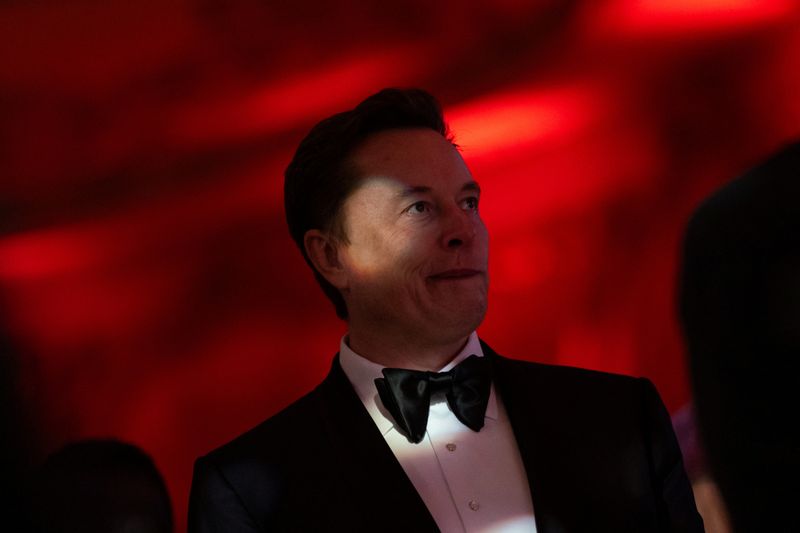By Tom Hals
WILMINGTON, Delaware (Reuters) - Tesla (NASDAQ:TSLA) cannot give Elon Musk a $56 billion compensation package despite a vote in support of the CEO's pay deal by the company's shareholders, a Delaware judge ruled on Monday.
Below is a look at what could come next for Tesla and its billionaire founder, who is still seeking a huge payday from the company:
WHAT DOES MUSK WANT?
Musk told a special committee of the Tesla board soon after a judge voided his compensation in January that he wanted a similar-sized replacement package, according to a securities filing.
In addition, earlier this year he said on his social media platform X that he wanted a larger stake in Tesla or he might develop some products outside the company. Musk's other companies include rocket venture SpaceX and Neuralink, which develops brain implants.
TESLA COULD APPEAL THE RULING
Musk and Tesla's board could appeal and try to reverse the ruling at the Delaware Supreme Court, a process that typically takes around a year.
The case, which involved the largest-ever pay deal at a U.S. public company, raises issues that have rarely been addressed by Delaware judges, adding uncertainty to an appeal.
For example, the trial court judge, Chancellor Kathaleen McCormick (NYSE:MKC), found that Musk controlled the compensation negotiations, even though he owned only about 22% of Tesla's stock.
In addition, Tesla has acknowledged that the June vote by shareholders to ratify Musk's pay was a "novel" legal tactic and has said it was unclear how it would be treated under Delaware law.
TESLA COULD DEVISE A NEW PLAN
Tesla's board could craft a new pay package, although that could be very expensive.
The original plan, agreed to by Musk and the company in 2018, awarded him stock options if the company hit very aggressive performance and financial targets. The stock options allowed Musk to buy Tesla stock priced at the 2018 level. The company exceeded the targets, and Tesla's stock has risen 10-fold since then, making the options incredibly valuable.
Tesla booked a cost of $2.6 billion when the 2018 plan went into effect. The company has said that a replacement plan for the same cost today would likely have to be less than 10% of the size of the 2018 plan.
COULD TESLA JUST RESTORE THE OLD PLAN?
Tesla could offer Musk the same 304 million stock options with the same $23.34 exercise price used in the 2018 plan. If shareholders wanted to challenge that, they would have to sue in Texas, where the company reincorporated this year, rather than the Court of Chancery in Delaware.
But the company cannot escape accounting and tax implications.
Tesla said putting the old plan back in place would require the company to take a $25 billion charge, according to securities filings.
In addition, because the stock options would be incredibly valuable from the moment they are issued, they would be treated unfavorably for tax purposes as income. Musk could be taxed at the highest rate and pay a 20% penalty, meaning authorities could tax his new plan at 57%, according to an analysis by Schuyler Moore of Greenberg Glusker Fields Claman & Machtinger.

MUSK COULD TRY TO SETTLE THE LAWSUIT
Musk could try to settle the lawsuit, which was brought by a Tesla shareholder, and accept a smaller portion of his pay package. However, that would contradict his track record of taking cases to trial rather than striking deals, even in the face of huge potential liability. It is unclear how McCormick would view a settlement at this stage in the litigation.